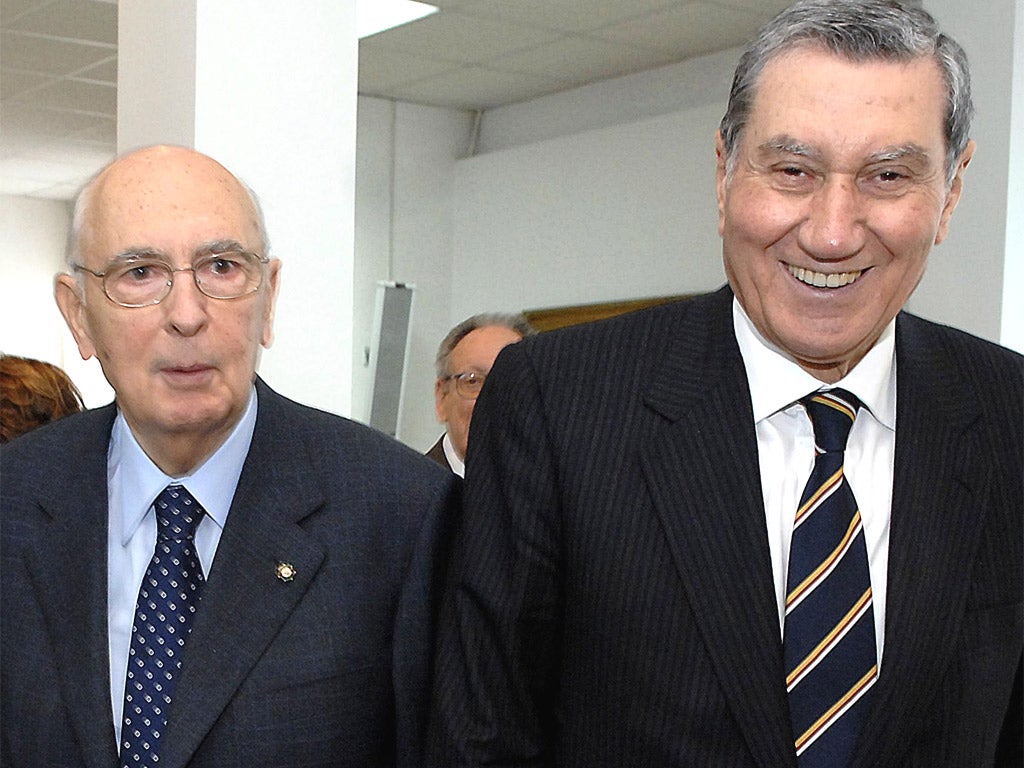Italian government in the dock as landmark Mafia trial begins
Berlusconi's daughter gives evidence as ex-minister and two former Cosa Nostra heads are indicted

Your support helps us to tell the story
From reproductive rights to climate change to Big Tech, The Independent is on the ground when the story is developing. Whether it's investigating the financials of Elon Musk's pro-Trump PAC or producing our latest documentary, 'The A Word', which shines a light on the American women fighting for reproductive rights, we know how important it is to parse out the facts from the messaging.
At such a critical moment in US history, we need reporters on the ground. Your donation allows us to keep sending journalists to speak to both sides of the story.
The Independent is trusted by Americans across the entire political spectrum. And unlike many other quality news outlets, we choose not to lock Americans out of our reporting and analysis with paywalls. We believe quality journalism should be available to everyone, paid for by those who can afford it.
Your support makes all the difference.Prosecutors in Palermo have indicted 12 men for alleged Mafia crimes, including the two most feared recent heads of Cosa Nostra and a former Interior Minister, in a case that has once again turned the spotlight on the relationship between Italian politics and organised crime.
The 12 indicted this week are arraigned on charges ranging from Mafia association to threats to the body politic. But behind all the accusations lies the same imperative, one which has stained and shamed much of the political history of post-war Italy: a compulsion on the part of political leaders to reach accommodation with organised criminals who over and over again proved themselves too ruthless, determined and united for the state to put them behind bars.
The highest-profile name on the charge sheet is Nicola Mancino. Now 81, Mr Mancino, a Christian Democrat who was Interior Minister at the time in question, and went on to become Speaker of the Senate, the second highest position in the state.
The charge sheet alleges secret talks between the Italian state and the Mafia in the early 1990s aimed at bringing a campaign of murder and bombing to an end. Mr Mancino is alleged to have withheld evidence revealing the existence of the talks. After the indictment was published he commented that he would prove his innocence and his "loyalty to the state".
But the case and its implications were brought bang up to date when it emerged from prosecutors' wiretaps earlier this month that Mr Mancino had telephoned President Giorgio Napolitano to urge him to get Italy's chief anti-Mafia prosecutor involved in the case – in an attempt, it appeared, to derail the local Palermo prosecutors' decision to indict him. The effort has clearly failed.
The murder in 1993 by the Sicilian Mafia of the courageous anti-Mafia magistrate Giovanni Falcone, followed a couple of months later by that of his close colleague Paolo Borsellino, revealed the Sicilian gangsters at their most ruthless and ambitious. By killing the two men who had been most effective in challenging the Mob's power on the island, the then capo di capi Salvatore "Toto" Riina threw a gauntlet down to the state.
As well as killing their pursuers, the Mafia launched attacks on monuments in Rome and Milan: by borrowing the tactics of the ultra-left Red Brigades, Riina hoped to bend the state to his will. The plan was foiled by a surge of public fury against the Mafia.
In their last months alive, Falcone and Borsellino became aware that their official protection against the Mob was weakening – that the state they were seeking to defend was toying with the idea of betraying them. If the indictments in this case are proved, the substance behind those fears will become clearer. It is claimed that political leaders including Mr Mancino were seeking to do a deal with the very people Falcone and Borsellino were trying to put away.
Also indicted is Marcello dell'Utri, Minister of Defence in Silvio Berlusconi's first government and co-founder with the media magnate of his first political party, Forza Italia. Despite winning a recent legal victory against Mafia association charges, a disturbing new wrinkle was added to Mr dell'Utri's CV last month when he went on trial accused of having extorted huge sums from Mr Berlusconi as the price of silence about the latter's claimed Mafia links. Mr dell'Utri denies the charges. Magistrates questioned Marina Berlusconi, the former premier's daughter, who is not suspected of any wrongdoing and spoke to them "as a victim and as a person with knowledge of the facts", according to the Berlusconi family lawyer Niccolo Ghedini.
The other politician on the list of Palermo indictments is Calogero Mannino, a former minister who is still an MP in the lower house. Far better known are the names of the Mafiosi indicted, who include Luca Bagarella and Giovanni Brusca, both serving life sentences. The convicted killer of Falcone, Brusca was dubbed during his years on the outside as "the Pig" and "the Christian killer" for his homicidal compulsions.
Join our commenting forum
Join thought-provoking conversations, follow other Independent readers and see their replies
Comments